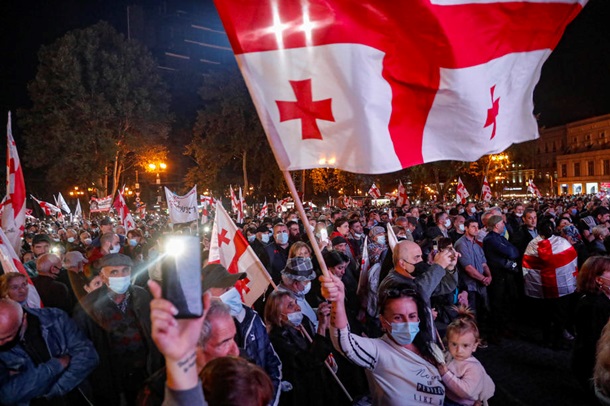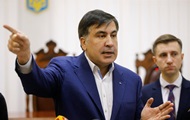Saakashvili from prison influences the political situation in Georgia
–
–
The return of Saakashvili to Georgia turned the political situation in the country upside down, while the ex-president is on hunger strike in prison, his associates rally in his support.
Mikheil Saakashvili remains in a Georgian prison, but even from there he acts as the main newsmaker not only in the country, but throughout the entire post-Soviet space. On the eve, details surfaced about how he nevertheless made his way to his native Georgia after nine years of absence.
Miho is no stranger to breaking through the border. In Ukraine, he just ran through the border point surrounded by associates, but in Georgia he acted more cunningly.
Milk van
The Ministry of Internal Affairs of Georgia established that on September 28 at about 23:00 a ship called Vilnius entered the port of Poti. It followed from the Ukrainian port of Chornomorsk. A Scania trailer, loaded with dairy products, departed from this vessel on September 29 at 1:04 am. Saakashvili was inside.
The former president of Georgia got out of the truck at 01:49 Tbilisi time in the port of Poti and thus illegally crossed the Georgian border. Saakashvili’s presence in the trailer is confirmed by the tapes taken from his phone.
After the second night, Saakashvili got into a Mercedes passenger car, which was meeting him. Four people have already been detained for helping Saakashvili in crossing the border in Georgia.
Hunger strike
The Georgian prosecutor’s office said that Saakashvili was officially charged with illegal crossing of the state border. Miho himself is now in penitentiary institution No. 12 in Rustavi, where the politician was placed after his arrest on October 1. He went on a hunger strike, calling himself a political prisoner, and the charges against him were fabricated.
In 2018, Saakashvili was found guilty in two cases. He was sentenced to 3 years in prison for pardoning former Interior Ministry officers convicted in the case of Sandro Girgvliani, and up to 6 years in the case of beating former deputy Valery Gelashvili.
Saakashvili has been on hunger strike for over 20 days. In prison he was examined by a council of doctors
and recommended that the politician be sent to a hospital for intensive follow-up.
“We made a recommendation for hospitalization in order to avoid complications of Saakashvili’s health condition, which could deteriorate at any moment,” Pagava said.
The decision to transfer Saakashvili from prison to a clinic should be made by the ministers of justice and health of Georgia, as well as local parliamentarians. The personal doctor of the third president of the country, Nikoloz Kipshidze, noted that Saakashvili himself should give consent to hospitalization. He admitted that Saakashvili would be hospitalized on October 23.
Political alignments
Last week, about 100,000 people gathered in the center of Tbilisi for a rally in support of Saakashvili – there have not been such large-scale opposition protests in the country for several years.
 –
–
EPA
–
Saakashvili’s arrival mobilized his supporters ahead of an important electoral event. On October 30, the second round of local elections will take place in Georgia. Having won in terms of the total number of voters, the ruling Georgian Dream party risks losing key cities. The second round of mayoral elections will be held in twenty Georgian cities, including all the largest ones. According to the results of the first round, the candidates from the Saakashvili party are leading in Kutaisi, Batumi and Zugdidi.
A loss in the capital could be a real disaster for the Georgian Dream. Now the likelihood of this does not look too high – the pro-government candidate, ex-footballer Kakha Kaladze received 45%, while his opponent, leader of the United National Movement Nika Melia – 34%.
The ex-president’s factor frankly worries the current government. The ex-president’s starvation also plays into the hands of the opposition. No matter how Western countries try to avoid interference in the Georgian elections, starvation is gradually changing the situation not in favor of the authorities.
– .


